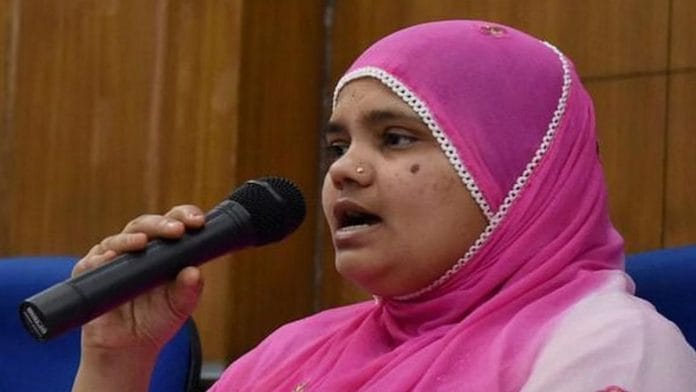As I tuned into the news back in 2022, I was shocked to learn that the Gujarat government had granted remission to the 11 convicts who had gang-raped Bilkis Bano and murdered members of her family during the harrowing 2002 Gujarat riots. How could a state government extend mercy to criminals who had committed such heinous acts against a woman? My agony and horror only deepened when I learned that they were not only pardoned but also garlanded upon their release.
However, a much-needed wave of relief washed over me when the Supreme Court stepped in to remedy the situation on 8 January. By sending these convicts back to prison, it has restored the faith of millions in India’s justice system. In a scathing rebuke, the court expressed in no uncertain terms that the Gujarat government was not fit to decide on the remission plea of the 11 men convicted of a “grotesque and diabolical crime driven by communal hatred.” This moment of justice, delivered in harsh, condemnatory language, serves as a beacon of hope and a reminder that the truth will always prevail over attempts to sweep heinous acts under the rug.
“I have wept tears of relief. I smiled for the first time in over a year and a half. I have hugged my children. It feels like a stone the size of a mountain has been lifted from my chest, and I can breathe again,” said Bano. And one cannot help but empathise deeply with her sentiments. However, it is also crucial to understand if we are truly addressing the core of the problem.
Analysing the verdict
A closer examination of the Supreme Court judgment reveals that it highlighted a significant technicality in the case – that of an “appropriate government”. Section 432(7)(b) of The Code of Criminal Procedure, which governs the power of remission, mentions that the state where the offender is sentenced holds the authority to pass an order of remission. This location is determined by the sentencing jurisdiction, and not necessarily where the crime occurred or where the convict is imprisoned. Considering these men were sentenced in a Mumbai special court, it is Maharashtra, not Gujarat, that holds the authority to review their remission application.
The essence of this decision revolves around defining an “appropriate government” rather than broader considerations of the “power of remission” and associated guidelines. This distinction underscores the need for a nuanced examination of legal intricacies and raises questions about whether our focus is aligned with the heart of the problem.
Also read: 20 crore Muslims have moved on from Babri Masjid and Ayodhya. Owaisi must as well
Ensuring checks and balances
I ardently advocate for restorative justice over retributive justice, favouring more liberal remission policies as a progressive approach. But I also find it imperative to stress the importance of a robust system of checks and balances. In this particular instance, there seems to be a glaring absence of a thorough process to assess whether the convicts had genuinely redeemed themselves and merited the granted remission.
I find it deeply unsettling that the Gujarat government appears to believe that some “good behaviour” and time in jail means these individuals have genuinely reformed themselves.
Another disconcerting aspect of this situation is its potential to cause division. The Gujarat government’s verdict could have been influenced by the fact that the convicts belong to a community crucial to their voter base. Conversely, the anticipation is that the Maharashtra government will make a more impartial decision, given that the convicts do not form a significant part of their voter demographic. It is important to note that the Bharatiya Janata Party (BJP) is in power in both states.
The current scenario underscores a familiar trend of appeasement politics. It is high time that political parties move beyond such identity-based strategies. Especially if they genuinely prioritise the well-being of India and its people. The evolving landscape demands a shift toward policies and decisions rooted in a broader commitment to national welfare and not specific demographic or identity groups.
Additionally, regardless of the multitude of laws and regulations in place, true progress will remain elusive until we witness a societal transformation. It is crucial to eradicate the perception that women are mere possessions and ensure their freedom from punishments rooted in communal animosity. A genuine solution will only materialise when the pursuit of justice for women becomes an unwavering priority across all communities, and an environment that ensures safety and respect for them is fostered.
The first step to achieving this, however, involves identifying individuals who punish women to exact revenge from their communities. This mindset intertwines communal biases with patriarchy, perpetuating a toxic combination. A stark example is the 1992 Ajmer rape case, which involved the serial gang rape and blackmailing of over 500 young women. When details of the case surfaced, revealing that most of the accused were Muslim and many victims Hindu, Ajmer erupted in uproar. This case serves as the distressing illustration of a mindset where women from other communities become deliberate targets. Recognising and addressing such deep-seated biases is paramount for creating a society where the well-being and dignity of all women are valued.
This troubling phenomenon, however, is widespread, even extending to the realm of social media, cutting across ideological camps. Women from opposing sides often encounter misogynistic abuses and threats of sexual violence upon expressing their views on these platforms. This only emphasises the pervasive nature of the challenge.
Amana Begam Ansari is a columnist, writer, TV News Panelist. She runs a weekly YouTube show called ‘India This Week by Amana and Khalid’. She tweets @Amana_Ansari. Views are personal.
(Edited by Zoya Bhatti)






